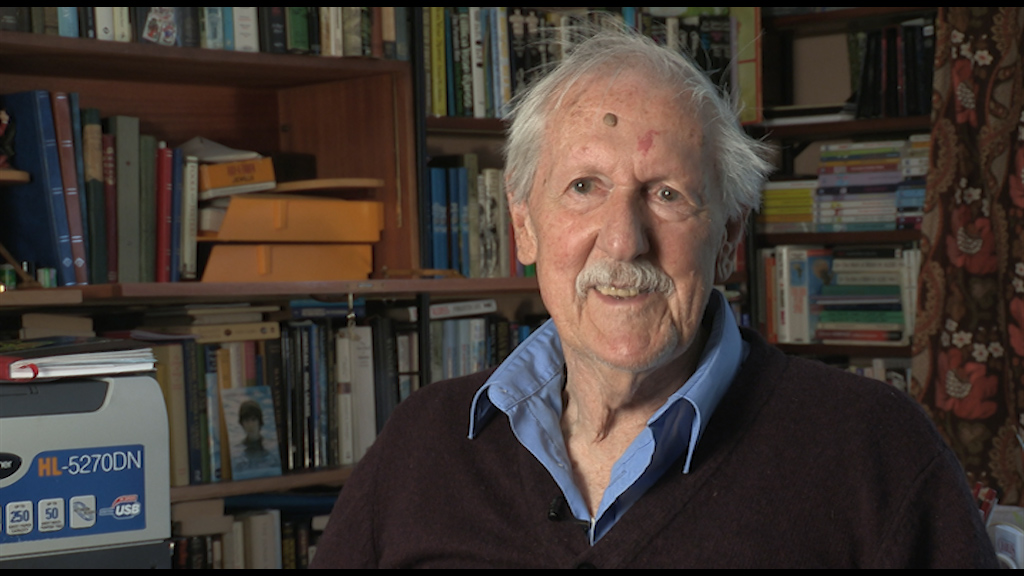NEXT STORY

The beginning of the end of the war
RELATED STORIES

NEXT STORY

The beginning of the end of the war
RELATED STORIES


|
Views | Duration | |
|---|---|---|---|
| 21. Breakfast on the move | 39 | 02:06 | |
| 22. The doorway of Burma | 45 | 02:34 | |
| 23. The Royal Signals' lot in Burma | 54 | 03:22 | |
| 24. Encountering the wildlife of Burma | 43 | 04:27 | |
| 25. Elements of culture in the midst of war | 44 | 03:37 | |
| 26. The beginning of the end of the war | 53 | 02:39 | |
| 27. A dreary homecoming | 44 | 02:14 | |
| 28. The most terrifying day of my life | 100 | 04:50 | |
| 29. The biggest tree in the world | 1 | 52 | 05:02 |
| 30. Farewell to India | 1 | 57 | 03:23 |


Oh and then, the other side of this barricade or fuselage... was part of a little village, and there there were only Burmese women as far as we could see, but they would come out and work... I don't know what they were doing with the grain, they were doing something or other with the grain, but they would… they would also have a dance. And so we were allowed to stand and watch them dance. And it was so peculiar that there, in the middle of this ghastly war, women danced. You know, it does say something about the other sex. Amazing.
So then we moved on again and eventually the troops took Mandalay. And so... yes, I think I was rather ill then, but our Signals truck drove into Mandalay, and we got out and walked about. And people used to sing... was that song written by Kipling? 'On the road to Mandalay, where the flying fishes lay' – 'play', sorry – 'and the dawn comes up like thunder out of China, across the bay'. Everyone knew that song.
But then, it's curious to think that even in those times, there were elements of culture. For instance, when we first went into Burma, when we were still in a kind of no-man's-land by Imphal, which was a smouldering ruin, we were then all gathered together before we dispersed into Burma. And the CO, whose name I once had, but I've now forgotten, the CO lectured to us about what we were doing for the honour of the British Empire, etc., etc. And he ended by quoting from... is it Henry V? 'Gentlemen in England now abed, shall hold their manhood cheap, whilst any speaks that fought with us, upon St Crispin's Day'.
And the effect that had was that many of… most of the troops, who'd never heard it before, shed tears or had tears in their eye. I've never forgotten it, it was wonderful that this CO should quote Shakespeare. Very fine, very fine. Yes.
Brian Aldiss (1925-2017) was an English writer and anthologies editor, best known for his science fiction novels and short stories. He was educated at Framlingham College, Suffolk, and West Buckland School, Devon, and served in the Royal Signals between 1943-1947. After leaving the army, Aldiss worked as a bookseller in Oxford, an experience which provided the setting for his first book, 'The Brightfount Diaries' (1955). His first science fiction novel, 'Non-Stop', was published in 1958 while he was working as literary editor of the 'Oxford Mail'. His many prize-winning science fiction titles include 'Hothouse' (1962), which won the Hugo Award, 'The Saliva Tree' (1966), which was awarded the Nebula, and 'Helliconia Spring' (1982), which won both the British Science Fiction Association Award and the John W Campbell Memorial Award. Several of his books have been adapted for the cinema. His story, 'Supertoys Last All Summer Long', was adapted and released as the film 'AI' in 2001. His book 'Jocasta' (2005), is a reworking of Sophocles' classic Theban plays, 'Oedipus Rex' and 'Antigone'.
Title: Elements of culture in the midst of war
Listeners: Christopher Sykes
Christopher Sykes is an independent documentary producer who has made a number of films about science and scientists for BBC TV, Channel Four, and PBS.
Tags: Mandalay, Shakespeare, Henry V
Duration: 3 minutes, 37 seconds
Date story recorded: September 2014
Date story went live: 17 August 2015